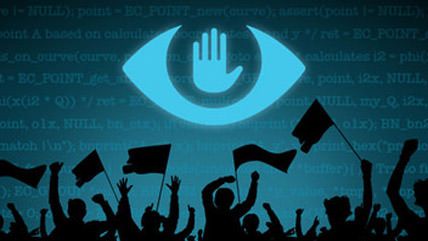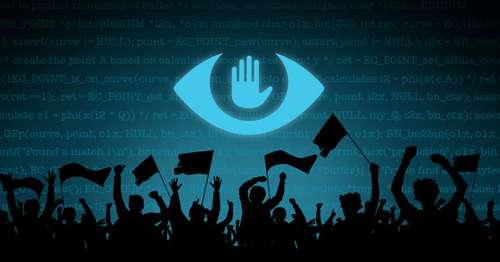The Day We Fight Back: Are Protests Worth it if They're Hokey?


Yesterday, "The Day We Fight Back" rallies took place in 24 cities around the world in rejection of National Security Adminstration's (NSA) surveillance. I attended the San Francisco event in order to witness the freedom fighters converge. Despite its inspiring title, the protest quickly went limp.
The event took place outside the AT&T building where whistleblower Mark Klein in 2006 exposed Room 614A, one of the NSA's telecommunications interception sites. One group showed up early with an impressive one-to-five scale model of a predator drone and plenty of picket signs. Mentions of surveillance cheerleader Sen. Diane Feinstein (D-CA) elicited universal boos. All the pieces of a good protest were accumulating.
Klein himself and the Electronic Frontier Foundation's (EFF) Rainey Reitman addressed the crowd over loudspeakers.
"This is our internet. We're going to fight for it. We're going to defend it. We're going to make sure you can't constantly surveill us… and chill our free speech," said Reitman, who detailed the EFF's legislative action against the NSA.
A Navy veteran who wished to remain anonymous shared his feelings. "I took an oath to defend the Constitution against all enemies, foreign or domestic. When I see the government spying on the people, it tells me that the government has declared that I and the American people are an enemy."
Unfortunately, organizers compromised the gravity and sincerity of these messages. Not once but twice they played The Police's "Every Breath You Take" ("Every move you make… I'll be watching you." Do you get it? It's a joke about surveillance. You get it, right?) and projected a Miley Cyrus parody titled "Party at the NSA" on the side of the AT&T building. These seemed particularly tone-deaf, since they aired before a memorial video for the late internet activist Aaron Schwartz.
Some participants also eventually repurposed an enormous circular protest sign about constitutional rights by playing parachute-type games reminiscent of grade school gym class. Guy Fawkes masks and meme-covered t-shirts added to hokiness. After about an hour, the protest's momentum drained.
The San Francisco Projection Department, which co-hosted the event, estimates that it had the highest turnout in the US with 300 participants, which is underwhelming for such a tech-centric city and not a good indication of how the others fared.
"The Day We Fight Back" was far more impressive online than it was on the streets.
Over 6,000 websites and organizations, from Reddit to the American Civil Liberties Union, expressed solidarity. Google and other internet giants signed a letter to the president calling for reform. Supporters have placed over 87,800 calls and sent 181,900 emails to their representatives. For all the "slacktivism" gibes web-based initiatives get, they do seem to have a real home field advantange when it comes to invigorating people about internet issues.


Show Comments (21)